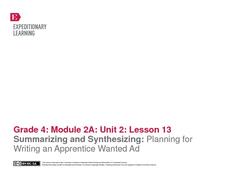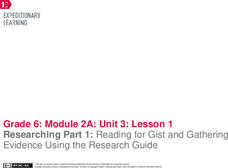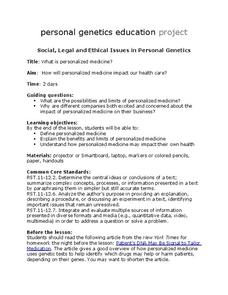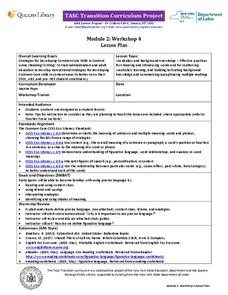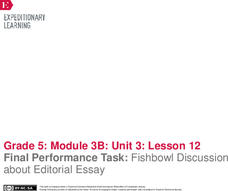Baruch College Writing Center
Summarizing, Paraphrasing, and Quoting Workshop
What's the difference between summarizing and paraphrasing? Show class members how to find the main ideas from informational text and condense it, restate it, or quote it directly with a series of educational activities based on two...
Curated OER
Paraphrasing and Summarizing
Read an article about the migration of our ancestors and write a paragraph. Pupils paraphrase and summarize to restate the information found in a nonfiction text. They write a shortened version of the reading to demonstrate the...
EngageNY
End of Unit 2 Assessment: Working with Two Texts - Reading, Listening, Summarizing, and Synthesizing
As a summative assessment for this unit on colonial trade, fourth graders listen to and read informational texts in order to demonstrate their ability to take notes, write summaries, and draw connections. Young scholars first listen as...
EngageNY
Summarizing and Synthesizing: Planning for Writing an Apprentice Wanted Ad
In instructional activity 13 of this unit on colonial trade, young researchers learn about apprentices as they prepare to write help-wanted ads for the specific trade they have been researching. To begin, the class listens closely as the...
Curated OER
Listening To a Guest Speaker
Pupils review the main points of note-taking to summarize the content of a formal or informal spoken presentation. They hear a guest speaker talk about a pre-arranged topic and take notes during the presentation. Next, they write a...
Student Achievement Partners
"The Glorious Whitewasher" from The Adventures of Tom Sawyer by Mark Twain with Mini-Assessment
It's the classic scene: Tom Sawyer is whitewashing a fence. Expose your learners to Mark Twain's humor while reinforcing reading comprehension. Eighth graders are encouraged to read and reread, achieving as much exposure to the text as...
EngageNY
Explaining the Relationships between Events in a Historical Text: Contextualizing the History of Baseball (pages 8–9, 25)
In other words ... it's time to give a summary. Scholars work with a partner to paraphrase a timeline card referring to Promises to Keep. They then work to merge the two timelines to create one timeline. Pupils finish by writing a...
EngageNY
Research Skills, Part 1: Natural Resource Development and How it Modifies the Physical Environment
Put it in your own words. Scholars complete a mini instructional activity about paraphrasing then complete a note catcher using the text A Limited Supply. They continue studying Canada's natural resources by analyzing the graph...
EngageNY
Listening Closely and Taking Notes: Colonial Trade Podcast About the Wheelwright
Voices from the past. Young scholars listen to a podcast interview with a historical re-enactor as they continue their research in the eleventh instructional activity of this unit on colonial trade. Applying their close reading skills,...
EngageNY
End of Unit Assessment, Part 2: Research and Response
Talk it out. Scholars complete part two of the assessment by participating in a World Café discussion activity. Learners circulate the room, sharing their ideas and thoughts about Canada's natural resources using quotes and paraphrasing...
What So Proudly We Hail
A Lesson on Benjamin Franklin’s “Project for Moral Perfection”
Benjamin Franklin identified 13 virtues that he felt would strengthen his character if he could focus on each one. A thorough lesson explores high schoolers' personal values in the context of their lives, and compels them to strive for...
EngageNY
Conducting Research: Asking and Answering our Questions about Rainforest Arthropods
Let's ask an expert. Scholars divide into groups to research and become experts on either ants or butterflies. Learners use task cards and text on their topic to complete a note catcher. At the end, they share their information with a...
EngageNY
Researching Part 1: Reading for Gist and Gathering Evidence Using the Research Guide
If only life came with an owner's manual. Pupils assemble with their research teams to discuss which of Steve Jobs' rules to live by most resonates with them. Scholars also read informational texts in pursuit of finding the gist and...
Teach It Primary
The Pied Piper of Hamelin
Six tasks make up a lesson plan designed to reinforce comprehension and language skills using the poem "The Pied Piper" by Robert Browing. Scholars discuss and define unknown words, identify adjectives and onomatopoeia, review complex...
National Endowment for the Humanities
“Read All About It”: Primary Source Reading in “Chronicling America”
Can investigative journalism become too sensationalistic and accusatory, or is it vital for the survival of a democracy? Middle schoolers analyze primary source documents from early 20th-century newspapers as well as Theodore Roosevelt's...
EngageNY
Structuring The Search: Categorizing Our Research
What can you contribute? Scholars read text to determine how ants contribute to the rainforest. First, they categorize and sort facts gathered from reading. Next, readers focus on specific terms in each paragraphs of the text Ants by...
EngageNY
Mid-Unit 3 Assessment, Part II: Organizing Notes for a Public Speech
It's all a matter of opinion! Pupils take Part II of the mid-unit assessment, in which they continue organizing their notes in preparation for writing an opinion speech. Using the resource, they add reasons, evidence, and a concluding...
EngageNY
Mid-Unit 3 Assessment: On-Demand Note-Taking about Howler Monkeys
Get the facts straight. Scholars complete their mid-unit assessment by reading a text, watching a video, and observing a picture about howler monkeys. They take notes about the facts they discover to use in future lessons.
EngageNY
Final Performance Task: Critique and Revision, Part II
Stop ... grammar time! Pupils complete worksheets to practice using the correct verb tense and identify correlative conjunctions. Next, scholars apply their new grammar skills to edit their draft opinion speeches.
Personal Genetics Education Project
Genetics and Reproduction
Disease prevention or designer babies? Use a set of slides to introduce the growing practice of preimplantation genetic diagnosis, or PGD. Teens read related articles and then break into groups to address different scenarios. Afterward,...
Personal Genetics Education Project
Personalized Medicine
Genetics learners read an article and watch a video about personalized medicine and the hope it holds for treating patients more specifically than doctors currently are able to. They research, design, and produce a brochure about the...
New York State Education Department
TASC Transition Curriculum: Workshop 4
Why is it important to use precise language? Participants explore this question in the fourth activity in a series of 15 on effective instruction. Perfect for all content areas, the activity promotes appropriate language choice through...
EngageNY
Final Performance Task: Fishbowl Discussion about Editorial Essay
Using the resource, learners share their essay revisions with a partner. Afterward, they participate in a Fishbowl discussion, receiving peer feedback about their editorial essays.
Personal Genetics Education Project
Introduction to Personal Genetics
Adolescents have the opportunity to consider how they feel about the possibilities presented by the current availability of genetic sequencing. After some instruction, they participate in a four-corners activity in which you read a...





